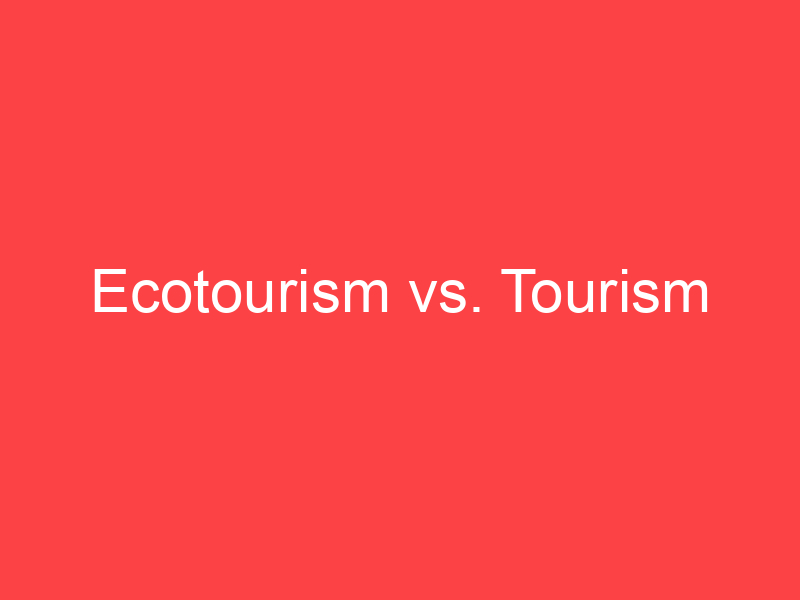Main Difference
The main difference between Ecotourism and Tourism is that the Ecotourism is a form of tourism and Tourism is a travel for recreational or leisure purposes
-
Ecotourism
Ecotourism is catering for holiday makers in the natural environment without damaging it or disturbing habitats. It is a form of tourism involving visiting fragile, pristine, and relatively undisturbed natural areas, intended as a low-impact and often small scale alternative to standard commercial mass tourism. It means responsible travel to natural areas, conserving the environment, and improving the well-being of the local people. Its purpose may be to educate the traveler, to provide funds for ecological conservation, to directly benefit the economic development and political empowerment of local communities, or to foster respect for different cultures and for human rights. Since the 1980s, ecotourism has been considered a critical endeavor by environmentalists, so that future generations may experience destinations relatively untouched by human intervention. Several university programs use this description as the working definition of ecotourism.Generally, ecotourism deals with interaction with biotic components of the natural environments. Ecotourism focuses on socially responsible travel, personal growth, and environmental sustainability. Ecotourism typically involves travel to destinations where flora, fauna, and cultural heritage are the primary attractions. Ecotourism is intended to offer tourists an insight into the impact of human beings on the environment and to foster a greater appreciation of our natural habitats.
Responsible ecotourism programs include those that minimize the negative aspects of conventional tourism on the environment and enhance the cultural integrity of local people. Therefore, in addition to evaluating environmental and cultural factors, an integral part of ecotourism is the promotion of recycling, energy efficiency, water conservation, and creation of economic opportunities for local communities. For these reasons, ecotourism often appeals to advocates of environmental and social responsibility.
Many consider the term “ecotourism”, like “sustainable tourism”, an oxymoron. Like most forms of tourism, ecotourism generally depends on air transportation, which contributes to global climate change. Additionally, “the overall effect of sustainable tourism is negative where like ecotourism philanthropic aspirations mask hard-nosed immediate self-interest.” That said, carbon offset schemes are being provided by (some) large airlines these days, and passengers can make use of them to eliminate these impacts.
-
Tourism
Tourism is travel for pleasure or business; also the theory and practice of touring, the business of attracting, accommodating, and entertaining tourists, and the business of operating tours. Tourism may be international, or within the traveller’s country. The World Tourism Organization defines tourism more generally, in terms which go “beyond the common perception of tourism as being limited to holiday activity only”, as people “traveling to and staying in places outside their usual environment for not more than one consecutive year for leisure and not less than 24 hours, business and other purposes”.Tourism can be domestic or international, and international tourism has both incoming and outgoing implications on a country’s balance of payments.
Tourism suffered as a result of a strong economic slowdown of the late-2000s recession, between the second half of 2008 and the end of 2009, and the outbreak of the H1N1 influenza virus, but slowly recovered. International tourism receipts (the travel item in the balance of payments) grew to US$1.03 trillion (€740 billion) in 2005, corresponding to an increase in real terms of 3.8% from 2010. International tourist arrivals surpassed the milestone of 1 billion tourists globally for the first time in 2012, emerging markets such as China, Russia, and Brazil had significantly increased their spending over the previous decade. The ITB Berlin is the world’s leading tourism trade fair. Global tourism accounts for ca. 8% of global greenhouse gas emissions.
-
Ecotourism (noun)
Responsible travel to natural areas supporting the fauna, flora, and local economy
“Ecotourism serves the environment and improves the well-being of indigenous peoples, too.”
-
Tourism (noun)
The act of travelling or sightseeing, particularly away from one’s home.
-
Tourism (noun)
The industry in which such travels and sightseeing are organized.
-
Tourism (noun)
Collectively, the tourists visiting a place or landmark.
-
Tourism (noun)
The act of visiting another region or jurisdiction for a particular purpose.
“libel tourism; suicide tourism; sex tourism”
-
Tourism (noun)
the commercial organization and operation of holidays and visits to places of interest
“the tourism industry”
“a national fund for the promotion of tourism”

